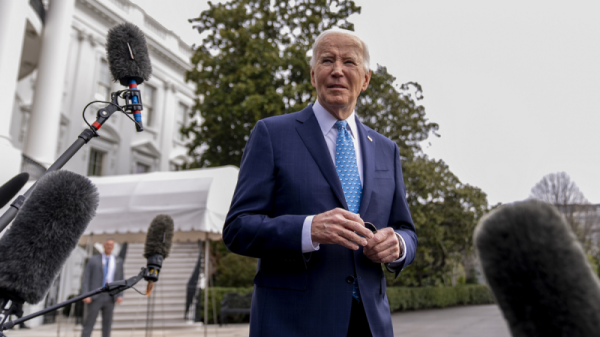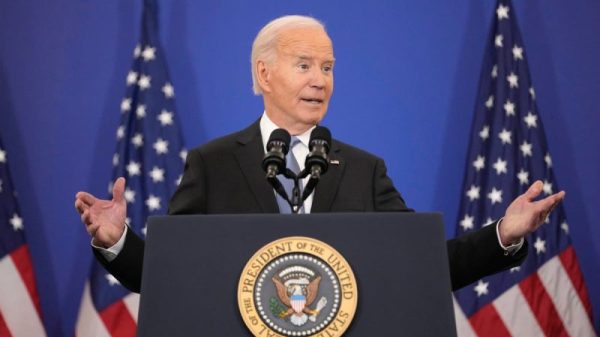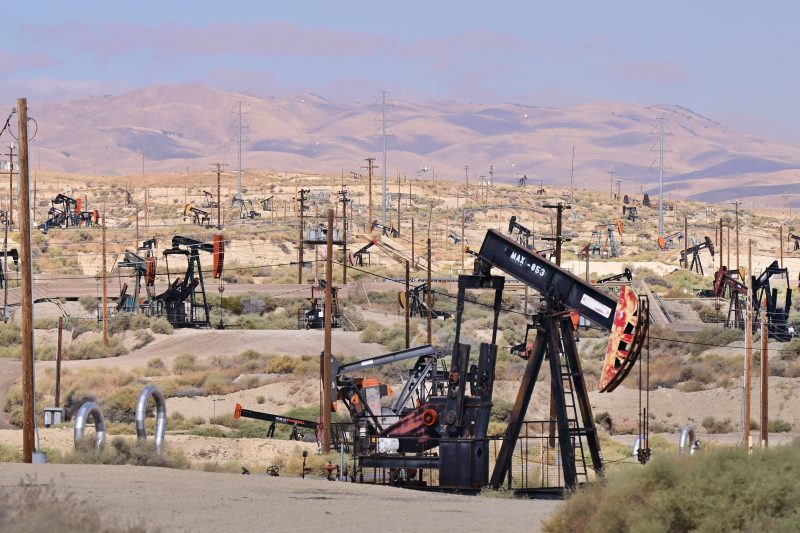You won’t hear President Biden talking about it much, but a key record has been broken during his watch: The United States is producing more oil than any country ever has.
The flow of huge amounts of crude from American producers is playing a big role in keeping prices down at the pump, diminishing the geopolitical power of OPEC, and taming inflation. The average price of a gallon of regular gasoline nationwide has dropped to close to $3, and analysts project it could stay that way leading up to the presidential election, potentially assuaging the economic anxieties of swing state voters who will be crucial to Biden’s hopes of a second term.
But it is not something the president publicly boasts about. The politics of oil are particularly tricky for Democrats, whose chances for victory in the 2024 elections could hinge on whether young, climate-conscious voters come out in big numbers. Many of those voters want to hear that Biden is doing everything in his power to keep oil in the ground.
“If you are not looking carefully at what the administration is actually doing, it is easy to get the wrong impression,” said Kevin Book, managing director at ClearView Energy Partners, a research firm. “There are a lot of things going on at once. This is an administration which is focused on the energy transition, but also taking a pragmatic approach on fossil fuels.”
The United States is producing about 13.2 million barrels of crude oil per day. That is millions of gallons more than is coming out of Saudi Arabia or Russia. It is more oil than was being produced even at its peak during the pro-fossil-fuels administration of former president Donald Trump, when production was 13 million barrels a day in November 2019.
Voters who listen to Trump and Biden speak may come away with the impression that the opposite is true. Trump recently told Fox News’s Sean Hannity that he would act as a dictator only on the first day of his presidency in 2025, in part because he wanted to “drill, drill, drill” for more oil. The former president has constantly attacked Biden’s clean energy agenda and accused him of squandering America’s prior “energy independence” because of allegiance to “environmental lunatics.”
While Biden’s White House has publicly celebrated the decline in gas prices and pledged to help consumers struggling with inflation, the president has largely stayed mum about the oil industry’s record output. In several speeches this year, he has blasted oil company executives for amassing record profits.
“They invested too little of that profit to increase domestic production and keep gas prices down,” Biden said during his State of the Union address in February. “Instead, they used those record profits to buy back their own stock, rewarding their CEOs and shareholders.”
The White House has also largely stayed mum on the oil production boom, instead touting Biden’s legislative record as the most ambitious effort to combat climate change in history and contrasting his stance with that of Trump and other deniers.
“The President is implementing the largest investment in climate ever, putting the United States on a path to cut climate pollution in half by 2030,” White House spokesman Angelo Fernandez Hernandez said in a statement. The statement praised Biden for protecting more than 21 million acres of public lands and waters and boosting clean energy manufacturing by invoking the Defense Production Act and facilitating private sector investments. “The President will continue to take bold climate action and rally world leaders to raise their collective ambition.”
The soaring domestic oil output has already begun to reshape geopolitical dynamics. The U.S. is producing so much oil that it has undermined the influence of OPEC, which failed when it tried to make production cuts recently to drive prices up globally. The amount cut was quickly backfilled by the U.S. and other non-OPEC nations, which gladly grabbed the market share OPEC forfeited.
The diminishment of OPEC influence gives Democratic operatives one less thing to worry about. It was only last year, during the midterm election, that Saudi Arabia embarrassed the administration by disregarding its requests not to cut production as prices at the pump were soaring. As things stand now, Saudi Arabia is not in a position to influence the U.S. election by pushing oil prices up as voting nears, which typically sours consumers on the incumbent in the White House.
The huge boost in U.S. oil production that has defied analyst expectations and driven energy prices down around the globe. White House policy is hardly the key factor, but it has helped. Biden’s vows on the campaign trail to restrict growth of fossil fuels gave way to a more moderate approach after Russia invaded Ukraine and prices soared. The signal he sent to the industry as voters struggled with high gas prices was clear: pump more.
“When the head of the U.S. government tells industry to produce more, that is significant,” Book said. “It reflected a sea change, and certainly the end of a campaign of very restrictive rhetoric.”
The shift, he said, gave oil companies and their investors the confidence to redouble their efforts to pull oil from the ground. They were able to ramp up production so high in large part because of efficiencies and innovations in the way oil is pumped.
“These companies have gotten more effective at drilling more rapidly,” said Mark Finley, a fellow in energy and global oil at Rice University’s Baker Institute. “They are drilling longer wells, and they are getting more production from each well.” He said analysts had not anticipated such strong growth because oil company investors were pressuring companies to scale back their infrastructure spending amid projections the energy transition will shrink the market for fossil fuels.
But, Finley said, the companies have managed to recalibrate their infrastructure investments and increase output at the same time.
It is a mixed blessing for Biden. At the moment, the administration appears content not to be taking too much credit. The continued attacks from Republicans accusing the president of jeopardizing America’s energy security with his focus on climate action are out of sync with the reality on the ground, but they give Biden cover with his base. At the same time, the relatively low gas prices help him with swing voters.
“While the administration is pushing for an energy transition, they know prices at the pump matter to the economy, consumer pocketbooks and also their reelection prospects,” Finley said.
Climate activists have slammed Biden’s agreement to fast-track a controversial oil pipeline in West Virginia and a separate decision to approve the Willow oil project in Alaska, which is opposed by environmentalists.
Some liberals have also criticized Biden’s assertion in August that he had “practically” declared a climate emergency with his environmental policies, saying he should actually declare one, to combat extreme weather and other threats. Biden has taken steps to reduce methane emissions and also signed historic climate and infrastructure legislation aimed at weaning the country off fossil fuels in the years ahead.
But the current rush of domestic oil production comes as the president’s push to facilitate a transition to electric vehicles is falling short of expectations, providing an uncomfortable contrast for the White House.
As U.S. oil production was soaring to record levels in December, Biden administration officials were at the U.N. Climate Change Conference in Dubai assuring world leaders that the U.S. would help lead the global transition away from fossil fuels. That dichotomy stood out to Amara Enyia, an activist and policy director for the Movement for Black Lives, who attended the conference, known as COP28.
“There’s this dissonance between the commitments that are being made versus what the administration is actually doing,” she said. “We’re seeing this sort of two-headed approach to climate — on the one hand, drilling permits, and then on the other, talking about the need to move away from fossil fuels.”
For his part, Biden has said his top domestic priority is reducing prices for Americans, and the relief at the pump carries potential benefits for his 2024 prospects.
A short-term boost in domestic oil production and a corresponding decline in gas prices could have a long-term benefit for environmentalists — helping prevent the return to power of Trump and other deniers of climate change, said Josh Freed, the director of climate and energy at the center-left think tank Third Way.
“The fastest way to end all of American climate action is to see oil prices dramatically rise and have Republicans get elected to office,” he said, commending Biden’s handling of the issue.
Whether Biden is successfully walking this tightrope is likely to remain a matter of debate ahead of November’s election. Climate activists say base voters are frustrated by the softening of the president’s stance against fossil fuels, and mobilizing them will prove difficult despite the historic investment the administration is making in green power and accelerating the energy transition.
Climate-conscious voters were particularly dismayed by the administration’s approval of the Willow project, which will allow hundreds of miles of roads and pipelines, airstrips, a gravel mine, and a major new processing facility in the middle of pristine Arctic tundra and wetland. For many, that decision was one of several signifying how Biden’s bold campaign promises to take on the fossil fuel companies yielded to dealmaking on permits and a more conciliatory approach toward the industry overall.
“You can’t solve the climate crisis without keeping fossil fuels in the ground,” said Jamie Henn, founder of Fossil Free Media, a nonprofit focused on ending oil and gas use. “Record oil production stands in the way of the energy transition … An ‘all of the above approach’ leads to flip-flopping on fossil fuels. It is bad policy, and also bad politics.”







































